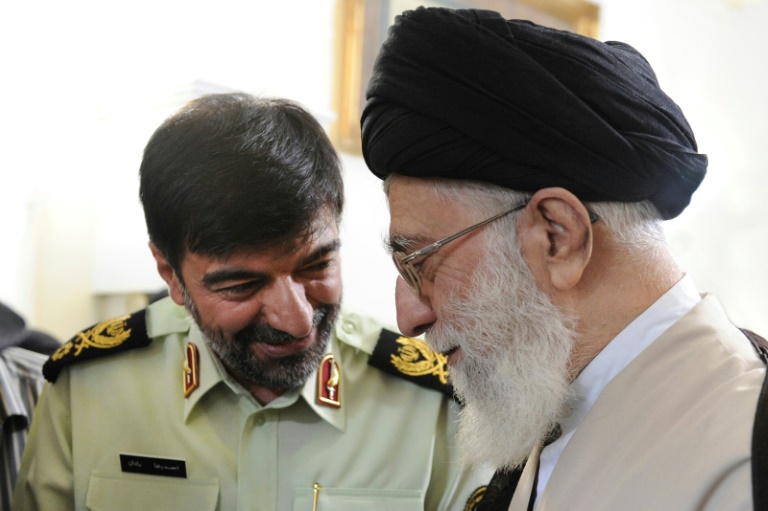Iran executes two more men in connection with protests » Capital News
Iran has executed four people in connection with the nationwide protests sparked by Mahsa Amini’s death © AFP / Justin TALLIS
Paris (AFP), Jan 7 – Iran drew international condemnation on Saturday as it executed two men for killing a paramilitary force member in November during unprecedented protests sparked by Mahsa Amini’s death in custody.
The latest hangings double the number of executions to four over the nationwide unrest, which has escalated since mid-September into calls for an end to Iran’s clerical regime.
They also come in defiance of a campaign by international rights groups for the lives of the two men to be spared.
Judicial news agency Mizan Online reported that “Mohammad Mehdi Karami and Seyed Mohammad Hosseini, the main perpetrators of the crime that led to the martyrdom of Ruhollah Ajamian, were hanged this morning.”
Prosecutors said the 27-year-old militiaman was stripped naked and killed by a group of mourners who had been paying tribute to a slain protester, Hadis Najafi.
The UN human rights office condemned the executions, which it said followed “unfair trials based on forced confessions”.
Washington said it condemned them “in the strongest terms”.
“These executions are a key component of the regime’s effort to suppress protests,” State Department spokesman Ned Price said.
The European Union said it was “appalled” by the use of the death penalty against civilian protesters.
A person in the Cypriot capital Nicosia checks a mobile phone displaying a tweet about the execution of Majidreza Rahnavard © AFP/File
German Foreign Minister Annalena Baerbock said the executions “strengthen us in our desire to raise the pressure further on Tehran with the EU”.
Iranian authorities have arrested thousands in their crackdown on the wave of demonstrations that began after the September 16 death of Iranian Kurdish woman Amini, 22, following her arrest for allegedly breaching Iran’s dress code for women.
Two other men were put to death in December, sparking global outrage and new Western sanctions against Iran. Mohsen Shekari and Majidreza Rahnavard, both 23, had been convicted of separate attacks on security forces.
– ‘Sham trials’ –
The slain Ajamian belonged to the Basij paramilitary force, linked to the powerful Islamic Revolutionary Guard Corps.
He died in Karaj, west of Tehran, on November 3 after being attacked with “knives, stones, fists, kicks” and dragged along a street, a judiciary spokesman said at the time.
Dozens of Iranian protesters face charges punishable by death, according to a rights group © AFP / John MACDOUGALL
Karami and Hosseini were sentenced to death in early December, Mizan said, while the Supreme Court upheld the decision on Tuesday.
Mahmood Amiry-Moghaddam, director of Oslo-based group Iran Human Rights (IHR), said both men “were subjected to torture, sentenced after sham trials… without the minimum standards for due process.”
IHR gave Karami’s age as 22. Hossein was 39, according to another Norway-based rights group, Hengaw.
Karami’s parents had in December issued a video pleading for authorities to spare his life.
Mashallah Karami described his son as a former national karate team member and told Iranian media that a family lawyer had been unable to access his case file.
Karami was not allowed to have a final meeting with his family, their representative, Mohamad Aghasi, said on Twitter.
– ‘Even more hardliners’ –
The pair were among 14 people courts have sentenced to death over the unrest, according to an AFP count based on official reports.
Iran’s supreme leader Ayatollah Ali Khamenei appointed General Ahmad-Reza Radan as the new police chief © KHAMENEI.IR/AFP
Four have now been executed, two others have had their sentences confirmed by the Supreme Court, six are awaiting retrials and two others can appeal.
Dozens of other protesters face charges punishable by death, IHR said in late December.
Campaigners called for stronger international action after the latest executions.
The New York-based Center for Human Rights in Iran urged countries to withdraw their ambassadors from Tehran.
Dutch Foreign Minister Wopke Hoekstra said he would summon the Iranian ambassador to “underline our serious concerns”, and called on other EU member states to do likewise.
Nearly four months into the unrest triggered by Amini’s death, supreme leader Ayatollah Ali Khamenei on Saturday appointed a new police chief.
General Ahmad-Reza Radan took over from Hossein Ashtari, said a statement posted on the leader’s official website. Khamenei ordered the police department to “improve its capabilities”.
Iran analyst Mehrzad Boroujerdi told AFP before the announcement that there had been “rumours that Khamenei has severely criticised” Ashtari’s performance.
He said he expected people like Ashtari to be replaced by “even more hardliners to maintain a tight grip” over the security forces.
burs-ami/kir/lg




